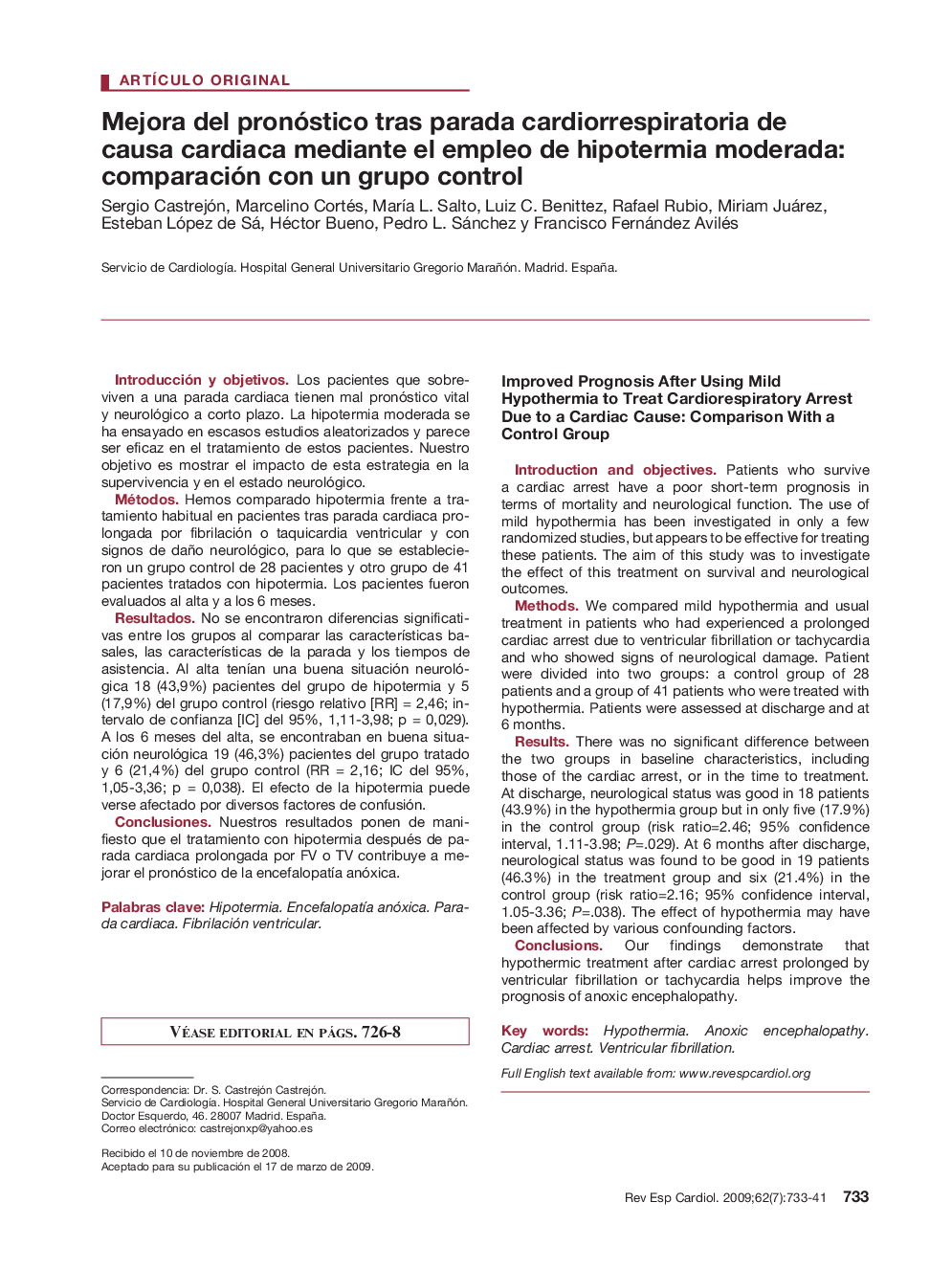| کد مقاله | کد نشریه | سال انتشار | مقاله انگلیسی | نسخه تمام متن |
|---|---|---|---|---|
| 3013625 | 1181860 | 2009 | 9 صفحه PDF | دانلود رایگان |

Introducción y objetivosLos pacientes que sobreviven a una parada cardiaca tienen mal pronóstico vital y neurológico a corto plazo. La hipotermia moderada se ha ensayado en escasos estudios aleatorizados y parece ser eficaz en el tratamiento de estos pacientes. Nuestro objetivo es mostrar el impacto de esta estrategia en la supervivencia y en el estado neurológico.MétodosHemos comparado hipotermia frente a tratamiento habitual en pacientes tras parada cardiaca prolongada por fibrilación o taquicardia ventricular y con signos de daño neurológico, para lo que se establecieron un grupo control de 28 pacientes y otro grupo de 41 pacientes tratados con hipotermia. Los pacientes fueron evaluados al alta y a los 6 meses.ResultadosNo se encontraron diferencias significativas entre los grupos al comparar las características basales, las características de la parada y los tiempos de asistencia. Al alta tenían una buena situación neurological 18 (43,9%) pacientes del grupo de hipotermia y 5 (17,9%) del grupo control (riesgo relativo [RR] = 2,46; intervalo de confianza [IC] del 95%, 1,11-3,98; p = 0,029). A los 6 meses del alta, se encontraban en buena situación neurológica 19 (46,3%) pacientes del grupo tratado y 6 (21,4%) del grupo control (RR = 2,16; IC del 95%, 1,05-3,36; p = 0,038). El efecto de la hipotermia puede verse afectado por diversos factores de confusión.ConclusionesNuestros resultados ponen de manifiesto que el tratamiento con hipotermia después de parada cardiaca prolongada por FV o TV contribuye a mejorar el pronóstico de la encefalopatía anóxica.
Introduction and objectivesPatients who survive a cardiac arrest have a poor short-term prognosis in terms of mortality and neurological function. The use of mild hypothermia has been investigated in only a few randomized studies, but appears to be effective for treating these patients. The aim of this study was to investigate the effect of this treatment on survival and neurological outcomes.MethodsWe compared mild hypothermia and usual treatment in patients who had experienced a prolonged cardiac arrest due to ventricular fibrillation or tachycardia and who showed signs of neurological damage. Patient were divided into two groups: a control group of 28 patients and a group of 41 patients who were treated with hypothermia. Patients were assessed at discharge and at 6 months.ResultsThere was no significant difference between the two groups in baseline characteristics, including those of the cardiac arrest, or in the time to treatment. At discharge, neurological status was good in 18 patients (43.9%) in the hypothermia group but in only five (17.9%) in the control group (risk ratio=2.46; 95% confidence interval, 1.11-3.98; P=.029). At 6 months after discharge, neurological status was found to be good in 19 patients (46.3%) in the treatment group and six (21.4%) in the control group (risk ratio=2.16; 95% confidence interval, 1.05-3.36; P=.038). The effect of hypothermia may have been affected by various confounding factors.ConclusionsOur findings demonstrate that hypothermic treatment after cardiac arrest prolonged by ventricular fibrillation or tachycardia helps improve the prognosis of anoxic encephalopathy.
Journal: Revista Española de Cardiología - Volume 62, Issue 7, July 2009, Pages 733–741